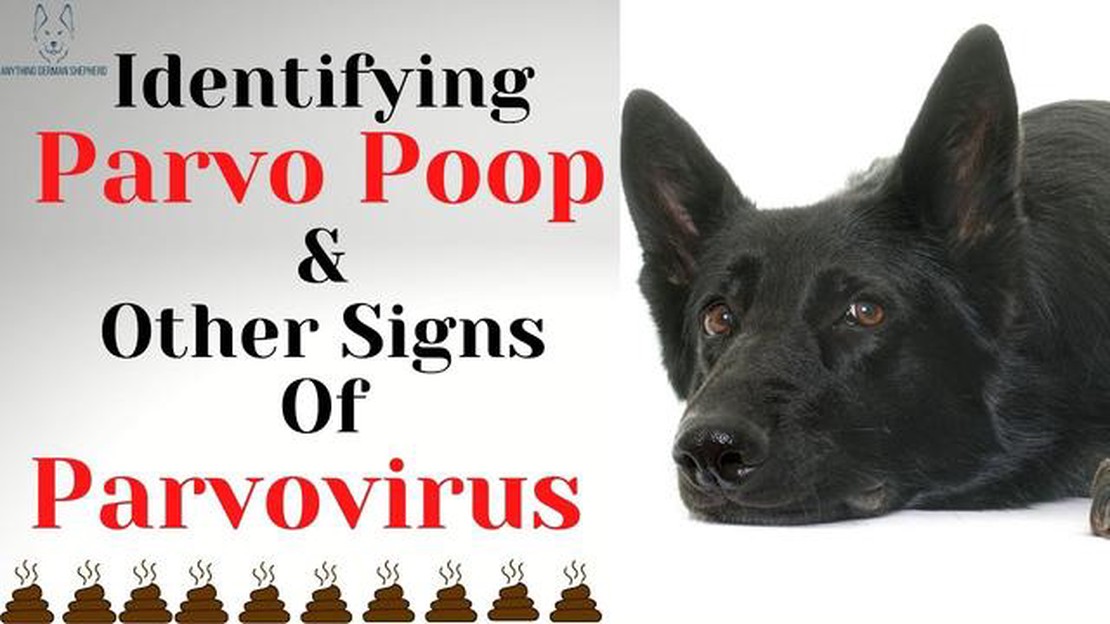Is Kibbles And Bits Made By Purina: Everything You Need To Know
Is Kibbles And Bits Made By Purina When it comes to choosing the right food for your furry friend, there are many factors to consider. One important …
Read Article
As a dog owner, it’s crucial to be able to recognize the signs of health problems in your furry friend. Two common issues that dogs can face are worms and parvo. Identifying these problems early on is essential for your dog’s well-being and can prevent further complications.
One of the most noticeable signs of worms in dogs is changes in their feces. You might notice worms or segments of worms in their stool. Additionally, dogs with worms may have diarrhea, vomiting, or a bloated abdomen. Weight loss, lethargy, and a dull coat can also indicate a worm infestation.
Parvo is a highly contagious virus that affects a dog’s gastrointestinal system. The most common symptoms of parvo include vomiting, diarrhea, and loss of appetite. Dogs with parvo may also experience dehydration, fever, and weakness. In severe cases, the virus can cause life-threatening complications, so prompt recognition and treatment are crucial.
If you notice any of these signs in your dog, it’s important to consult with your veterinarian. They can perform tests and recommend appropriate treatments to address the issue. Remember, early detection can make a significant difference in your dog’s overall health and well-being.
Parvo is a highly contagious viral disease that affects dogs, particularly puppies, and can be fatal if not treated promptly. Early detection and swift action are crucial in saving your dog’s life. Here are some signs to look out for:
If you notice any of these symptoms in your dog, it is crucial to contact your veterinarian immediately. They will perform a thorough examination and may recommend diagnostic tests, such as blood tests or a fecal sample, to confirm the presence of parvo. Early intervention can significantly increase the chances of a successful recovery for your dog.
Being able to recognize the early warning signs of worms or parvo in dogs can be crucial for their health and well-being. Whether it’s worms or parvo, both can cause serious health issues if left untreated. Therefore, it’s important for dog owners to be knowledgeable about the signs and symptoms that may indicate the presence of worms or parvo in their pets.
Signs of Worms:
Signs of Parvo:
Read Also: Discover the Meaning and Significance of Odin's Wolves Name
If you notice any of these early warning signs of worms or parvo in your dog, it’s important to consult with a veterinarian as soon as possible. Early detection and treatment can significantly improve your dog’s chances of recovery and prevent further complications.
When left untreated, worms or parvo can have serious consequences for dogs. Ignoring the signs or delaying treatment can result in the following:
It is important for dog owners to seek veterinary care at the first sign of worms or parvo to prevent these potential consequences. Early diagnosis and treatment greatly increase the chances of a full recovery and reduce the risk of long-term complications.
Preventing and treating worms and parvo in dogs is crucial for their overall health and well-being. Here are some important steps to take:
Read Also: Can Male Dogs Sense Human Female Ovulation? Discover the Fascinating Truth
If your dog has already been infected with worms or parvo, timely treatment is crucial. Here are some treatment options:
Remember to consult your veterinarian for personalized advice and guidance on preventing and treating worms and parvo in your specific dog. Early detection and prompt treatment significantly increase the chances of a successful recovery.
The signs of worms in dogs can vary, but some common symptoms include weight loss, a bloated belly, diarrhea, vomiting, and a dull coat.
If you suspect that your dog has worms, you should look out for signs such as weight loss, a bloated belly, diarrhea, vomiting, and a dull coat. It is important to take your dog to the vet for a proper diagnosis.
The symptoms of parvo in dogs can include severe vomiting, bloody diarrhea, fever, loss of appetite, and lethargy. If you notice these symptoms in your dog, it is crucial to seek veterinary care immediately.
If you suspect that your dog has parvo, you should watch out for symptoms such as severe vomiting, bloody diarrhea, fever, loss of appetite, and lethargy. It is essential to get prompt medical attention for your dog if you observe these signs.
Yes, there are other signs that could indicate worms or parvo in dogs. These include decreased energy, coughing, dehydration, pale gums, and a poor appetite. If you notice any of these symptoms, it is important to consult with a veterinarian.
Is Kibbles And Bits Made By Purina When it comes to choosing the right food for your furry friend, there are many factors to consider. One important …
Read ArticleAre Labs Considered Large Breed Labrador Retrievers, commonly known as Labs, are one of the most popular dog breeds around the world. They are known …
Read ArticleDog With 6 Toes Have you ever seen a dog with six toes? These unique and fascinating creatures are known as polydactyl dogs. With extra fingers or …
Read ArticleDo Pitbulls Have Rear Dew Claws When it comes to pitbulls, there are many questions that come to mind. One of the common queries is whether or not …
Read ArticleCan Dogs Have Grape Jelly As dog owners, we often find ourselves wondering if it’s safe to share certain foods with our furry friends. One particular …
Read ArticleMy Dog Ate Cigarettes If your dog has ingested cigarettes, it can be a cause for concern. Nicotine is toxic to pets, and even a small amount can be …
Read Article